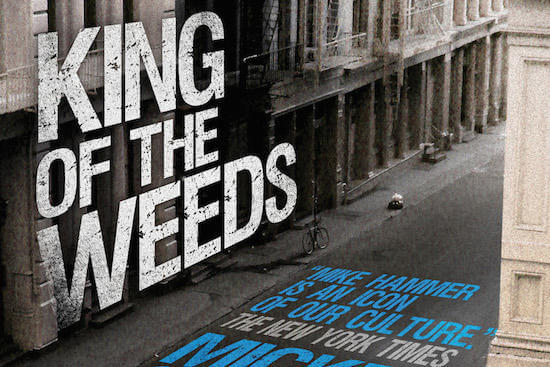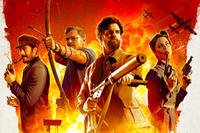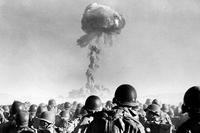
UTR favorite Max Allan Collins has once again channeled Mickey Spillane and completed what the author planned as the final Mike Hammer novel. King of the Weeds is the sixth time Collins has finished one of Spillane's unfinished Hammer projects and he's consistently delivered high quality work, much better than you usually get from the "brand extension after author's death" genre.
In King of the Weeds, Mike Hammer’s cop pal Captain Pat Chambers is nearing retirement, and Mike and his gorgeous secretary Velda are planning a much overdue marriage. It’s a mellow time for America’s toughest detective, until an assassin’s bullet almost brings him down on his doorstep.
The shooting of Hammer's WWII army buddy Marcus Dooley figures prominently in the plot and our exclusive excerpt below talks about their war service before Dooley's deathbed confession sets the novel's plot in motion.

CHAPTER TWO
The $89 billion began for me with an old army buddy, Marcus Dooley. Toward the end of the war, he got Pat Chambers and me into the intelligence end of the military, steering us into police work. Pat and I had gone into the blue uniforms of the NYPD, though I quickly went private when playing by the rules became a problem.
Dooley never made it onto the force. He never bothered trying, not when he’d been mustered out on a Section Eight. He’d gone Asiatic, as we called it in the Pacific, after months of backing Pat and me up during those deadly choruses of singing bullets and blazing shrapnel. Going crazy in the insanity of combat only made sense, but tell that to the peacetime hiring corps. In the years right after the war, Dooley was nothing better than a bum, boozing, womanizing, doing odd jobs to stay afloat, and there had been nothing Pat and I could do to guide him onto a better path.
Finally Dooley fell in with a dipso dame and when a bender almost killed her, the couple staggered into a hospital and took the cure. They straightened each other out for a while, and he was running a fairly successful landscaping business in Brooklyn as recently as twenty years ago. He had a kid, too, named Marvin—well, no kid by now, probably in his forties, anyway—but the wife had died somewhere back in the fuzzy past, that liver she’d ravaged finally catching up with her. Or maybe she fell off the wagon. I don’t know.
The truth is, we had lost touch. Pat delivered rumors about Dooley on occasion—the existence of the son, the passing of the wife, the business that fell apart—and the next time I heard about Marcus Dooley, he had been shot in the guts by an intruder in his house in Brooklyn. Pat had told me that, too, but it was no rumor…
We were both wounded warriors, Dooley and me. I’d just spent three months in Florida trying to get over Azi Ponti’s .357 kisses in my side. I should have been dead, but it had been cold enough that night, six below, for surface blood to coagulate into cloth and skin, clotting into a kind of makeshift bandage. A washed-up drunk of a doc who happened on the scene decided to make me an experiment in redemption. He dragged me across the rough red-streaked pavement while men screaming made discordant harmony with approaching sirens.
I had not fully recuperated when Pat called me to tell me our old pal Dooley had been murdered. Well, not quite murdered yet—he was in the hospital, holding death back till he could talk to me…
And death was hovering in that hospital all right, waiting its turn with the husk of a once-husky man whose breathing was shallow and whose woozy gaze said narcotics were giving him a brief trip to Happyland before the lights went out all the way.
He’d already told Pat that he hadn’t got a good enough look at the shooter to recognize him—just a dark shape in a doorway, an unlocked door shoved open onto Dooley sitting at a little desk, doing his monthly bills, fifteen feet away. Three slugs from a .357—one more than the late unlamented Azi Ponti had given me. But one more was enough to make me a survivor, and Dooley a casualty.
He didn’t want to talk about getting shot at all. If I’d thought he’d called Mike Hammer to his bedside to avenge his ass, I’d got it wrong.
Dooley had a story to tell me. A story he felt he just had to share before cashing out…
And nobody ever cashed out richer than Marcus Dooley.
Like Congress, mob kingpins don’t have term limits—they rule as long as they can last.
So the turnover at the top isn’t frequent, unless a killing war starts. Don Angelo lived to be ninety-something, and that kind of longevity was bad news for the latest generation of the five New York families. Many of them had seen their own fathers confined to minor roles, and the thought of never rising to the top while these retirement-home candidates maintained power was a bitter damn pill the Young Turks were not content to swallow.
They demanded more control, more power. They were a college-educated generation, with technological skills, a computer-savvy crowd that had done much for the Mafia cause by moving into legitimate big business. The days of booze and whores were ancient history; the new mob was high-tech crime and Wall Street finance, with unions and entertainment industry remaining from the old days but contemporized into legality. Yes, drug trafficking continued, but on so large a scale that kilos of H were tonnages now, operations insulated with Russian and Columbian confederates that assured nothing bad could come home to roost.
The dons were grateful to the young pups, paid them well, patted them on the head and back, heard their complaints and suggestions with silent understanding… but ceded no power. The new generation accepted this, perhaps too graciously. So much so that suspicions grew…
The heads of the five families checked the records, computer and otherwise, using top-end independent accountants, who delivered the bad news: news:the younger generation… the youngest generation… was using their combined computer skills to screw their elders, siphoning off income in a cutting-edge variation on the old two-sets-of-books philosophy.
For now, the dons kept this knowledge to themselves, and the capos of all five families convened in Miami to find a remedy, and a bloodbath of their own children and grandchildren was not acceptable. The youngest of the old dons, Don Lorenzo Ponti, suggested a solution so radical, so simple, that it brought immediate smiles and nods.
Cash out.
Empty everything out of banks, both here and abroad, from safe deposit boxes to numbered accounts. Turn as much capital into cash and other paper as possible, and hide it all away from the punks who betrayed them, but who they dared not kill or even replace, needing their expertise and not wanting to slaughter their own. The only thing more unforgiving than a mob boss, after all, was a mob wife-and-mother.
Hell, computer gymnastics could be played by anybody knowledgeable, no matter how old and infirm. Cash flow would be business as usual, from Wall Street to Columbia, and what was emptying out of Switzerland, the Bahamas, and the Cayman Islands could be concealed.
When that process was complete, the capital behind the conglomerated empire that was the five New York Mafia families would be hidden away till some later date and decision.
Soon cash and valuables were moved by truck to secure warehouses until it was time to transfer everything to a single, even more secure location. That location would have to be immense as well as secret—no small task—because a million in hundreds would fill a carton the size of a clothes dryer.
And a billion meant a thousand such cartons.
Eighty-nine thousand such cartons would together contain, more or less, eighty-nine billion in cash, stocks and bonds.
This was where Marcus Dooley came in.
Dooley was no mob guy. If he’d had his way, he’d have been a cop… once upon a time, anyway. Twenty years ago, he was just a middle-aged guy with a dead wife and a dead business, and when old Don Angelo hired him on, as the handyman and gardener at the apartment house the don owned as well as lived in, getting any kind of gig must have seemed a gift from God. Or, anyway, Godfather.
Of course, Dooley being ex-military intelligence meant that the old don now had a handyman/gardener who could pack a gun and add some security to the mix. Everybody coming up a winner. And after Don Angelo died peacefully in his bed, Dooley was happy to go to work in the same capacity for Don Lorenzo Ponti.
This was a step up—Dooley would not be in charge of an apartment house, but Ponti’s Long Island estate, several New Jersey rental properties, and the don’s apple farm in the Adirondacks. Dooley could hire and fire additional help, order any supplies he needed, even set his own hours—a trusted employee who Ponti took a real shine to. That was not to say Dooley didn’t rake grass, plant shrubs and take out the garbage, and he remained a general handyman. But an inordinately valued one.
In his glorified gardener’s role, Dooley made twice Captain Pat Chambers’ yearly salary, and bought a house of his own, a nice old fixer-upper in a crummy Brooklyn neighborhood.
No doubt Dooley had been told not to live suspiciously high on the hog—dons like Ponti worked at not showing off their wealth. Mob royalty like Lansky lived peasant-like existences in little houses or apartments, their wives doing the cleaning and cooking; but they had estates in Sicily, and when they traveled, it was first class all the way.
The don’s home on Long Island, for example, suited a middle-level exec, and his Adirondacks estate was an unpretentious two-story farmhouse, made to look smaller by the vastness of its yard—a yard maintained by that trusted employee, Marcus Dooley.
Don Ponti found a trusted friend in his hard-working caretaker, a man who seemed not interested in money beyond a fair paycheck generated by steady work. Ponti had on occasion clued Dooley in on quick easy scores, but Dooley showed no interest. This convinced the don that Dooley was the man for a particular job.
On a mountainside near the Ponti estate was a vast cavern, large enough to house those eighty-thousand cartons. Dooley did not share with me the exact details of the transfer of cartoned-up cash, but I gathered that Dooley was at the wheel of the lead vehicle of a caravan of rental trucks driven by lower-echelon mob soldiers.
How long the unloading took, Dooley also did not specify. His deathbed story had understandable gaps. My guess is it took many trips over many weeks, and to preserve the secrecy of the location, Dooley led the city-boy drivers through a circuitous backwoods route to a spot where those drivers would be unlikely to be able to return on their own. Probably work lights were set up to go through the night, the cave’s entrance allowing trucks to be driven in and unloaded, which they were, deep into the cool, dry natural cathedral, and then backed out again.
Finally, when the last boxes had been arranged into a cardboard fortress six cartons high and fifty feet wide, disappearing into darkness like a train into a tunnel, all of the workers were assembled for their reward.
Final reward.
My guess was that Dooley looked on aghast as some other trusted Ponti delegate presented the don’s thanks for a job well done, and it wasn’t a gold watch—more like a good old-fashioned tommy-gun massacre, creating echoing thunder in that cavern, scaring the bats, spilling shells that would still be there, sharing space with scattered corpses long since turned to skeletons.
It was like old pirate days, when those who buried the treasure were slain without benefit of burial themselves; or back when the Pharaohs paid off their workers in similarly harsh fashion, locking them in a tomb within a pyramid.
Why had Dooley lived as long as he did, with his secret?
Seemed that the ex-military intelligence man had already exercised a precaution—or was it a betrayal?—by switching locations on Ponti. After dummying road signs and covering up paths, and other methods of disguise and deception, Dooley had not led the trucks to the mountain cavern on Ponti’s property, but to a similar one a mountain over… a cavern used in Prohibition days by an old pal of Dooley’s, the late bootlegger, Slipped Disk Harris.
The five dons likely had a plan for that money—there was talk of trying to buy Cuba back, or some other Caribbean island where they might create a new Havana. It wasn’t like them to just let that kind of capital sit—in the old days, it would have gone into business, unions, casinos.
But over the decade that followed, the dons of the five families were busy dying—perishing by natural causes, or causes that were made to look natural. Heart attacks, falls down stairs, preceded a succession of gaudy funerals right out of 1920s gangland days, reminiscent of a criminal life passing into history. What media cameras did not record were the faint smiles on long faces of younger family members who were finally about to come into their own.
My conversation with Marcus Dooley on his deathbed did not fill in every blank. At what point Don Ponti realized he’d been had, I did not know. But apparently about six months before that waterfront war I got caught up in, the Young Turks had put in new upgraded, more sophisticated computers that uncovered the missing $89 billion.
I never did find out exactly why Marcus Dooley, who held such a valuable secret, was murdered even as Don Ponti and his renegade son Ugo were both looking for the mountain hoard, with the U.S. Government clambering right behind. Why kill the man who alone on the planet held the $89 billion secret?
I still didn’t know the answer to that. But a clue Dooley left, by putting me in charge of returning his earthly remains to his son, had led Velda and me to that cave, and its secret.
On the urn containing Dooley’s ashes was what purported to be his army serial number, but in reality were longitude and altitude indicators. They led us to that cave on Slipped Disk’s mountainside, which had been examined by mob guys and government experts alike, but did not give up Marcus Dooley’s final secret: that he had used explosives to block off half of the cave, and that eighty-nine thousand cartons of loot were behind what appeared to be a landslide of boulders and rubble fallen from above along a far wall.
Velda and I had rented a backhoe and done the excavation ourselves. I had opened a single carton and removed some walking around money—basically enough to buy Velda her own rock, that fifteen-grand diamond on her left hand, and to generously pay me for a case conducted for no client.
Using some plastic explosive that had been thoughtfully left in my heap a while back to kill my ass when I turned on the ignition, I sealed that damn cave back up. Don Ponti had, at this stage, been killed by his own homicidal son Ugo, whose ass I had delivered to Pat Chambers and a prison cell.
And now, with the exception of a few hundred grand or so, that eighty-nine billion was still back there, hidden away in a mountainside cave, with nobody to look after it but the bones of dead gangsters.




